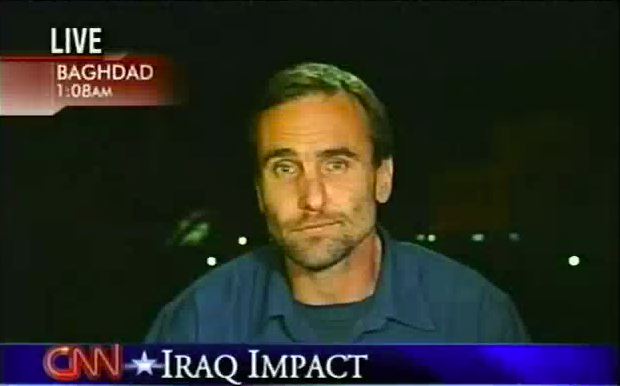TSR: Rumsfeld resigns

Click photo to play
Length: 3:19
WOLF BLITZER: So what impact will the departure of Donald Rumsfeld and the political turnabout here in Washington have on the war in Iraq?
Let's turn to CNN's Michael Ware.
He joins us live from Baghdad. What's the likely reaction going to be, first of all, in the Iraqi government of the prime minister, Nouri al-Maliki?
MICHAEL WARE, CNN CORRESPONDENT: Well, Wolf, I mean, clearly the Iraqi government has no influence over the appointments within the U.S. administration. Indeed, the administration makes it very clear that Iraq itself is a sovereign government. I mean, really, they're just going to have to accept this, obviously, and they're going to have to work with whomever is in the position that has now seen -- been filled -- Wolf.
BLITZER: What about the insurgents or the terrorists or those who presumably might say, you know what? This is a victory for the insurgency, those who are against the United States. It's a sign of American weakness. That could cause, potentially, some serious ramifications.
WARE: Certainly. I think you will see the insurgent propaganda campaign attempt to capitalize on this in any way it can. I mean it's leapt on every opportunity that has come its way in the past and as we are well aware, they monitored this election very closely.
So the aftershocks they're seeing with the departure of Secretary Rumsfeld will have registered out in the insurgency and they'll very clearly start including that now in their information operations or propaganda.
BLITZER: And there was a strong message sent from Washington -- don't misread what is happening because U.S. resolve, according to the White House, still remains strong in dealing with the insurgency, in dealing with the war in Iraq.
On a day to day basis, though, as you talk to U.S. troops -- and you've been embedded with a lot of U.S. military personnel over these past three years plus -- what do you sense they're saying to themselves as they are on the front lines actually fighting this war?
WARE: Well, Wolf, someone here in Baghdad -- be it the soldiers, be it people from the State Department, be it contractors, be it anyone involved with the U.S. mission here -- the big question now is what will this mean to us here on the ground? Is this going to be a shift?
I mean there's been many schools of thought, within military circles, political circles, within strategic analytical circles about the path for this war, about assessing the true nature of this war, what the problems really are and how to address them.
So they'll be asking, does this change that? Is this a signal of any kind of shift in policy or in thinking? And most urgently, one wonders what the generals must be thinking?
They'll now be wondering what will happen if they ask for more troops, if they ask for a different kind of composition of their forces.
Who's going to decide? Is there a clear policy line?
Everyone is going to be asking themselves these kinds of questions -- what does it mean, Wolf?
BLITZER: Michael Ware reporting for us from Baghdad.
Michael, thank you.

Click photo to play
Length: 2:31
LOU DOBBS, CNN ANCHOR: The war in Iraq had a huge impact, of course, on this midterm election. Now, just what sort of effect will these election results have on the war itself and our troops?
Joining us now from Baghdad, our Michael Ware. Michael, do you think the events of the last 24 hours will change anything on the ground there any time soon?
MICHAEL WARE, CNN CORRESPONDENT: Well, certainly not in the short-term, Lou. I mean, you cannot turn an oil tanker at sea on a dime. I mean, even if there's the greatest intent or will for dramatic or urgent change it's simply not doable in such a short timeframe. And the real question that I'm sure the Iraqi government is asking itself, Tehran and Damascus will be asking, and commanders here on the ground will be asking is how real a change is this going to be.
Does this in fact signal some kind of a shift in strategic thinking within the White House? How much is this going to compound what could lead to a period of some strategic confusion as the House determines what its way forward shall be and how that works in concert with the administration, specifically the new secretary.
I mean the bottom line is everyone is going to be now wondering how will it impact strategy as it relates to here on the ground. And quite frankly, that's wide open in the wake of the election, and now in the wake of this stunning development with the resignation of Secretary Rumsfeld.
DOBBS: That resignation of Secretary Rumsfeld, Michael, you work with every day our troops in the field, there in Baghdad, what's the reaction of those troops to the secretary's resignation?
WARE: Well, it's very difficult obviously for the troops to talk, certainly publicly about their opinions of the secretary. I mean, though civilian leadership, that's the top of the military chain. They cannot criticize their leadership. And since the announcement came here in Baghdad, 8:00 p.m. local time just on the eve of curfew, it's been impossible for me to speak to troops. But I know there's been enormous disenchantment with Secretary Rumsfeld and the troops will be hoping that this is a signal of some change. They just don't know what.
DOBBS: As do none of us. Michael Ware, thank you very much. Michael Ware reporting tonight from Baghdad.
